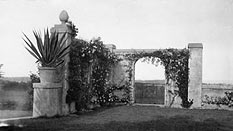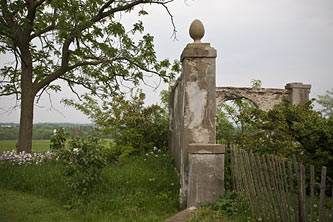
Linwood Gardens
Pavilion, New York
Tree Peony Collection Pavilion, New York
history continued
Over the past two decades, Lee Gratwick has slowly reclaimed the formal gardens and repaired the home. In 1998, the estate was listed on the National Register of Historic Places for to its significance to landscape architecture and horticulture and for its role in regional history and cultural life. Linwood Gardens has become one of the most important — if not the most important site — in the history of the American tree peony. It is where Saunders hybrids were first propagated and Daphnis hybrids were first created. Today, the collection also includes Japanese varieties and Gratwick’s own selections. The horticultural contributions of Linwood, both past and present, are all the more important in that few growers today specialize in tree peonies, with reverence to the length of time (an average of ten years) for a new tree peony hybrid to flower.
For the past nine years, the gardens have been open to the public on weekends when the tree peonies are in bloom. In addition, for the past six years, a nonprofit educational organization has offered art classes and workshops on summer weekends. Funds raised from donations during the tree peony festival, from workshops, and from the sale of a few plant divisions, are used to maintain the gardens and summer house.

